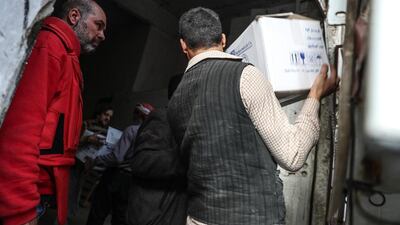Heightened violence in Syria is always followed by informal denunciations of the regime, formal condemnation of it in the United Nations, theatrical affirmations of the world's determination to help Syrian civilians, and a woeful failure to do anything. This is the abject routine that international diplomacy has followed over the eight years of the Syrian civil war, granting, in effect, impunity to Bashar Al Assad, the Syrian president, and his international backers, as they have gone about reducing redoubts of resistance across Syria to rubble.
As Panos Moumtzis, the UN's humanitarian co-ordinator in Syria, told The National earlier in the week, the worsening crisis in Eastern Ghouta has revealed "a failure of international diplomacy, a failure of humanitarian diplomacy". Mr Al Assad's continuing campaign to choke the life out of the rebel-held enclave outside Damascus amounts to a damming indictment of "the UN security council and us as an international community", which have failed abysmally "to intervene and bring an end to people's suffering" in Syria. Mr Moumtzis has previously served in Iraq and Rwanda. His frustration stems from the fact that, distracted by politics, the world can't even ensure the safe entry into Eastern Ghouta of trucks loaded with humanitarian supplies. The offer by Russia, Mr Assad's chief military ally which last month voted for a 30-day ceasefire at the UN Security Council, to cease hostilities for five hours a day is evidently insufficient.
Mr Moumtzis says "enough is enough". But what difference will all of this make on the ground? Evidence and history suggest that no amount of violence by Mr Al Assad and his backers is enough for the world to take decisive action to stop the violence in Syria. From Swiss prosecutor Carla del Ponte to Mr Moumtzis, men and women of conscience who have sought to bring justice and help to Syrians have found the system failing them at every turn. But the world cannot abandon Syria or give up on the instruments of diplomacy it so painstakingly built up. The Security Council reiterated on Wednesday its call for the implementation of the ceasefire. The UN is what its members want it to be – but if its noblest aspirations are repeatedly stamped upon by its most powerful members in order further their own political goals at the expense of countless innocent human lives, it falls to others to rise to their defence. The UN has been made to fail Syrians; those who still value its mission must now break with the routine find a new path.

